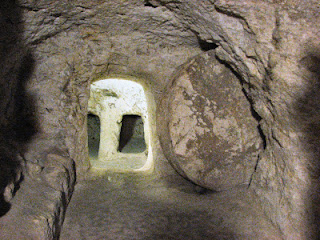Did Jesus "become sin" for us?
Most English translations of 2 Corinthians 5:21 state that for our sake God made Jesus who “knew no sin to be sin.” A better understanding and translation of this verse is that “for our sake He made him who knew no sin to be a sin offering.”
In Hebrew, the word חטאת hatat can be both “sin” and “sin offering”. There are many examples of both uses. The two meanings can be seen in a comparison of, for example, Lev. 4:14 and Psa. 32:5 (sin), to Lev. 4:24 and Ezek. 40:39 (sin offering). The same word is used for both “sin” and “sin offering” because the “sin offering” becomes the symbol or representation of sin. The sin offering becomes the substitutionary means by which the guilt and punishment of the sin is removed. But the animal which was given as a “sin offering” was innocent. The animal didn’t become sin, but became the innocent “sin offering” replacement for the guilty sinner.
Jesus didn’t “become sin” on our behalf, but he became the “sin offering”. The Innocent One bore our sin and sin’s penalty on our behalf. The Messiah-sin-offering was God’s desire and means of reconciling the world to Himself (Gal. 1:4). God the Father did not, to quote a modern praise song, “turn his face away” from the sin offering. That implies that the Father didn’t accept the offering, or that Jesus became detestable to the Father. Rather, it was the will of the Father for the Messiah to offer himself (Gal. 1:4, 2 Cor. 5:19). And the Father was pleased by the offering (John 8:29). Messiah’s self-sacrifice was “a fragrant offering and sacrifice to God” (Eph. 5:2).
The Son of Man servant who gave “his life as a ransom for many” (Mark 10:45) was pleasing to the Father. “Behold my servant, whom I uphold, my chosen, in whom my soul delights” (Isaiah 42:1, Matt. 12:18).
The current translations of 2 Corinthians 5:21 appear to be an example of misunderstanding Scripture because of a lack of Old Testament backgrounds. It is important to note (as others have pointed out when this was first posted) that the Greek translation of the Old Testament (LXX) likewise represents "sin" and "sin offering" with the same word (a`marti,a). Paul knew the nuance between “sin” and “sin offering”, using a`marti,a in 2 Cor. 5:21 to express both meanings to his Greek-speaking readers. The author of the Book of Hebrews likewise says that Messiah’s one time sacrifice makes it unnecessary for any additional “sin offering” (Heb. 10:14-18).
In Hebrew, the word חטאת hatat can be both “sin” and “sin offering”. There are many examples of both uses. The two meanings can be seen in a comparison of, for example, Lev. 4:14 and Psa. 32:5 (sin), to Lev. 4:24 and Ezek. 40:39 (sin offering). The same word is used for both “sin” and “sin offering” because the “sin offering” becomes the symbol or representation of sin. The sin offering becomes the substitutionary means by which the guilt and punishment of the sin is removed. But the animal which was given as a “sin offering” was innocent. The animal didn’t become sin, but became the innocent “sin offering” replacement for the guilty sinner.
Jesus didn’t “become sin” on our behalf, but he became the “sin offering”. The Innocent One bore our sin and sin’s penalty on our behalf. The Messiah-sin-offering was God’s desire and means of reconciling the world to Himself (Gal. 1:4). God the Father did not, to quote a modern praise song, “turn his face away” from the sin offering. That implies that the Father didn’t accept the offering, or that Jesus became detestable to the Father. Rather, it was the will of the Father for the Messiah to offer himself (Gal. 1:4, 2 Cor. 5:19). And the Father was pleased by the offering (John 8:29). Messiah’s self-sacrifice was “a fragrant offering and sacrifice to God” (Eph. 5:2).
The Son of Man servant who gave “his life as a ransom for many” (Mark 10:45) was pleasing to the Father. “Behold my servant, whom I uphold, my chosen, in whom my soul delights” (Isaiah 42:1, Matt. 12:18).
The current translations of 2 Corinthians 5:21 appear to be an example of misunderstanding Scripture because of a lack of Old Testament backgrounds. It is important to note (as others have pointed out when this was first posted) that the Greek translation of the Old Testament (LXX) likewise represents "sin" and "sin offering" with the same word (a`marti,a). Paul knew the nuance between “sin” and “sin offering”, using a`marti,a in 2 Cor. 5:21 to express both meanings to his Greek-speaking readers. The author of the Book of Hebrews likewise says that Messiah’s one time sacrifice makes it unnecessary for any additional “sin offering” (Heb. 10:14-18).


Comments